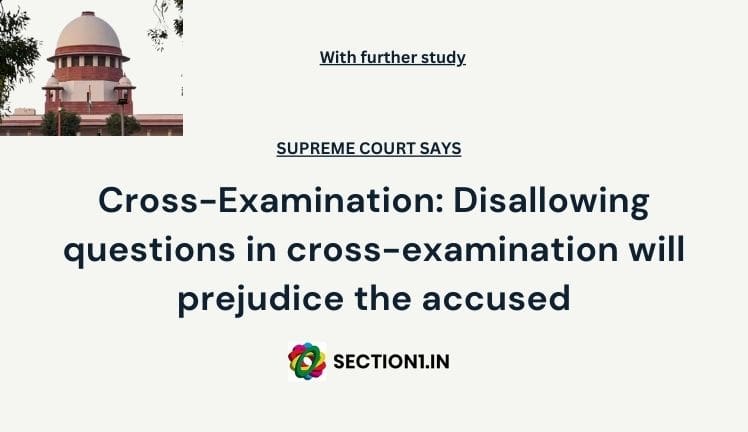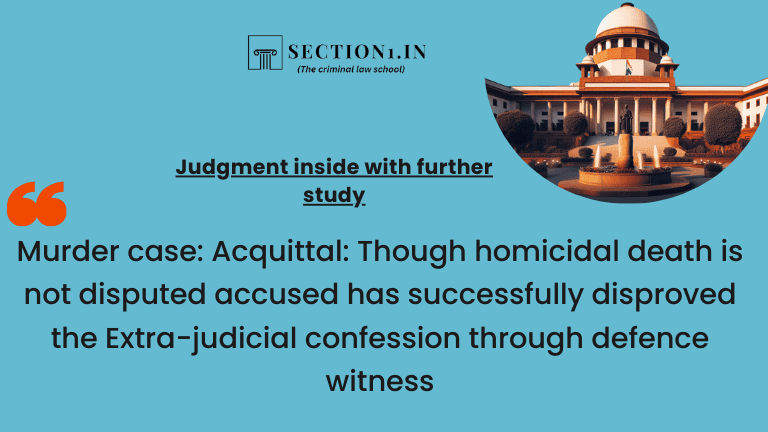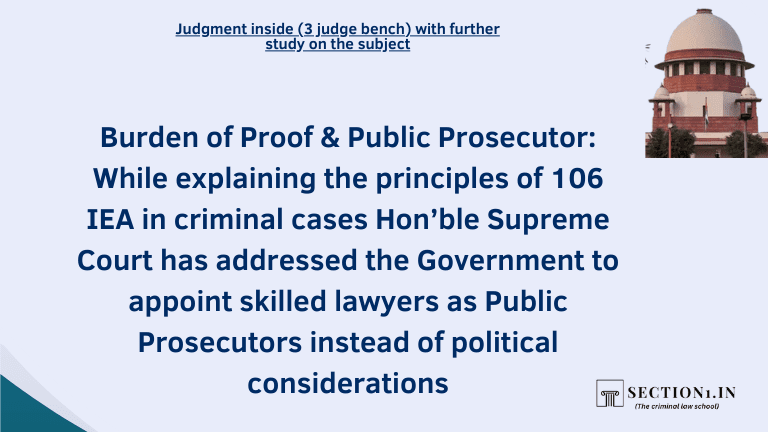Appeal
2. The incident, which is the subject matter of these Appeals, is of 6th March, 1996. There were five accused, who were prosecuted for the offence punishable under Section 302 of the Indian Penal Code, 1860 (for short, the “IPC”). One of them was also prosecuted for the offence punishable under Section 109 read with Section 302 of the IPC. The offence alleged was of committing the murder of one Siddhnath Patel.
3. In an appeal preferred by the convicted accused, the High Court passed an order of acquittal, which is challenged by way of these two Appeals before us. Criminal Appeal No.1163/2018 is preferred by the son (Chandrasekhar Patel) of the deceased, who is PW-2, and the other Appeal (Criminal Appeal No.1164/2018) is preferred by the State.
5. When an Appellate Court deals with an appeal against an order of acquittal, it is no doubt true that the Appellate Court has to re-appreciate the evidence of the prosecution witnesses. After reappreciating the evidence on record, the Appellate Court has to examine whether the Court which passed the order of acquittal, on the basis of the same evidence, could have recorded a finding of acquittal. In other words, the Appellate Court has to examine whether the finding recorded by the Court acquitting the accused is a possible finding, which could have been arrived at on the basis of the evidence on record. If the answer to this question is that the view taken by the Court which acquitted the accused is a possible view taken on the basis of the evidence on record, only because the Appellate Court is of the opinion that a contrary view is also possible, it cannot interfere with the order of acquittal. The reason is that the presumption of innocence is further strengthened by the acquittal of the accused.
Trial court disallowed several questions in cross-examination
6. We have independently analyzed and appreciated the evidence of 2 PW-1 to PW-5.
7. After having perused the evidence of PW-1, we find that during the cross-examination of the witness, the Trial Court has disallowed several questions. The presence of PW-1 at the site was attributed to the case made out by him in the examination-in-chief that he had acquired a land on rent in the village. In the cross-examination, he could not tell the khasra number of the land and the precise area of the land as well as the names of the other account-holders. In that context, some questions were attempted to be asked, which were disallowed by the Trial Court. The disallowed questions were whether the field was irrigated or not irrigated; from which place he purchased fertilizers; and whether the money received by selling soyabean and wheat was deposited in his bank account. These questions were asked as the witness in paragraph 24 of the cross-examination, after he expressed his inability to mention khasra number of the land and other particulars, claimed that he was taking the crop of soyabean and wheat. In the cross examination, he accepted that he was a body builder and he had received championship award at the University on two occasions. In this context, a question was asked during the cross-examination when the second stab injury was caused, whether he attempted to help the deceased. Even this question was disallowed.
8. The claim of the witness was that he saw the incident while he was slowly proceeding on a moped. When the incident happened, he got up from the moped and saw the incident. Therefore, a question was put to him whether houses were situated where he stood. Even 3 this question was not permitted to be asked.
9. After having carefully perused the cross-examination of PW-1, we are of the view that several material questions, which were very relevant, were not allowed to be put to the witness. This will certainly cause prejudice to the accused. These questions were put with the object of showing that the version of the witness was not truthful. The questions were put with the object of proving that the prosecution case was doubtful.
Disallowing questions in cross-examination will prejudice the accused
16. An argument was attempted to be made that firstly, there is no prejudice caused to the accused by not permitting certain questions to be put to PW-1 and, secondly, even if, there is a prejudice, the evidence of PW-1 can be discarded.
17. The second submission is over-simplification of the problem. An accused has a right to cross-examine a prosecution witness. As we have already recorded that certain material questions, which were very relevant, were not allowed to be put to the witness. We cannot imagine what would have been the answers given by the witness had those questions been allowed to be asked. If the questions would have been allowed, there was a possibility that the answers might have been relevant to discredit the other witnesses.
18. According to us, not allowing the relevant questions to be put to the eye-witness, who is stated to be the independent witness, causes serious prejudice to the defence of the accused. It is too late in the day now to remand the case to the Trial Court for further cross-examination of the said witness because a period of 27 years has elapsed from the date of the incident.
20. Therefore, we have no manner of doubt that the ultimate conclusion recorded by the High Court that the guilt of the accused was not established beyond a reasonable doubt, is certainly a plausible conclusion which could have been arrived at on the basis of the evidence of the prosecution. This is our view after carefully scrutinizing the evidence of the material prosecution witnesses.
21. Therefore, no interference is called for with the impugned judgment of acquittal. The Appeals are, accordingly, dismissed.
CHANDRASEKHAR PATEL APPELLANT(S) VERSUS SURESH & ORS. RESPONDENT(S) – CRIMINAL APPEAL NO(S). 1163/2018 WITH CRIMINAL APPEAL NO. 1164/2018 – 2023 INSC 1083 – NOVEMBER 30, 2023.
https://main.sci.gov.in/supremecourt/2010/5008/5008_2010_8_103_48658_Judgement_30-Nov-2023.pdf
Ananthan vs Pallipalayam Police Station
Further study
Cross-Examination: Whether defence counsel can argue if he does not ask question in cross






